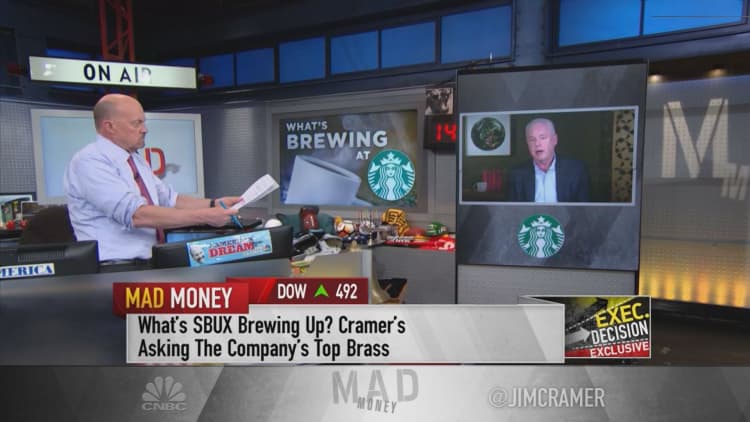Starbucks workers at three cafes in Buffalo, New York, voted this week on whether to form a union, a choice that could have far-reaching implications for the coffee giant and broader restaurant industry.
Mail-in voting concludes Wednesday and the National Labor Relations Board will begin counting votes Thursday afternoon. Roughly 100 employees who work at the company-owned locations are eligible to participate in the election, based on the voting list drawn up by Starbucks.
Unions are rare in the restaurant industry. Only 1.2% of workers at food and drinking outlets were members of unions in 2020, below the private-sector unionization rate of 6.3%, according to the Bureau of Labor Statistics. But if the Starbucks workers in Buffalo vote in favor of a union this week, the decision could have an impact that stretches beyond the coffee chain.
"I feel like once people have the awareness that they can take some steps on their own behalf to improve their workplace with their coworkers, they'll do it," said Cathy Creighton, a union attorney and director of Cornell University's Industrial and Labor Relations branch in Buffalo.
Union drives from Amazon workers and strikes by John Deere's and Kellogg's employees have filled headlines this year, bringing more attention to organized labor. A tight labor market has also given workers the confidence that they have the power to push employers for higher pay and better benefits.
In Buffalo, organizing workers have shared a number of problems that they believe can be fixed by a union, like understaffing, training and pay.
The union effort has faced strong opposition from Starbucks management. The company sent top executives and former CEO Howard Schultz to the Buffalo locations, a move that Starbucks Workers United called "union busting." Starbucks appealed to the NLRB in Washington to broaden the union vote across the entire Buffalo market, which includes 20 cafes, but the request was denied Tuesday.

In November, workers filed a federal labor charge, accusing Starbucks of illegal activity like engaging in a campaign of threats, intimidation and surveillance in response to the union push. The company has denied the allegations.
Starbucks Workers United also claims that the voting list created by Starbucks includes ineligible employees who work at other Buffalo locations but were briefly assigned to voting cafes. The group will likely voice their objections to the NLRB during the vote count.
Starbucks has previously been successful at squashing union drives in New York City and Philadelphia. If organizers are successful in Buffalo, it would be the first union representing workers at its U.S. company-owned locations. The company's sole unionized location in Canada ratified a contract with Starbucks this summer.
"We respect the process, and we're going to navigate through this by staying true to our mission values and just operating as one Starbucks," CEO Kevin Johnson said on CNBC's "Mad Money with Jim Cramer" Tuesday evening. "This is three stores out of 9,000 stores, and we're going to figure it out."
Jaz Brisack, a Starbucks barista at its Elmwood Avenue cafe in Buffalo and a member of the Starbucks Workers United organizing committee, said she wakes up every day to messages from fellow Starbucks workers in other states reaching out for advice on how they can start a union drive. Baristas in Mesa, Arizona, have recently filed for a union election.
A longtime Starbucks employee who works at a Buffalo location not included in the vote said she opposes unionizing but believes that Starbucks Workers United will be successful. She requested anonymity because of a fear of backlash from her coworkers.
Other Buffalo residents have been more supportive of the union efforts. Brisack said customers have been showing their support for the union by placing mobile orders with "union solidarity" in place of their names.
Outside of Buffalo, the union drive has generated high-profile support from the likes of Sen. Bernie Sanders, I-Vt., and Rep. Alexandria Ocasio-Cortez, D-N.Y.
"I think having all of that support means that we will hopefully be able to bring Starbucks to the bargaining table and get them to not delay that process because we believe the whole world is watching, knowing that their customers support us," Brisack said.
If workers vote in favor of a union, the next hurdle is negotiating a contract with Starbucks. Labor laws don't require that the employer and union reach a collective bargaining agreement. On top of that, workers who lose faith in the union can petition to decertify after a year, putting a ticking clock on negotiations.
Atlantic Equities analyst Edward Lewis wrote in a note to clients Sunday that he's watching closely to see if the effort succeeds and spreads to other markets. He downgraded the stock to neutral, citing concerns that momentum may be slowing given same-store sales declines in China and rising labor cost inflation in the U.S.
Shares of Starbucks have risen 8% this year, giving it a market value of $137 billion. The stock is on pace for its worst year since 2017.



